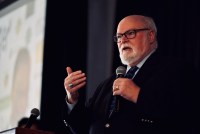Latest KFF Health News Stories
Widely Used Surgical Masks Are Putting Health Care Workers At Serious Risk
Because high-end N95 masks are scarce, medical centers are using surgical masks that have been linked to considerably higher infection rates.
Amid Coronavirus Distress, Wealthy Hospitals Hoard Millions
As the coronavirus threatens the finances of thousands of hospitals, wealthy ones that can draw on millions — and even billions — of dollars in savings are in competition with near-insolvent hospitals for limited pots of financial relief.
Lawmaker Pushing Mental Health Reform: It’s ‘More Needed Than Ever’
Gov. Gavin Newsom has asked lawmakers to pare down their legislative wish lists and focus on the state’s coronavirus response. But state Sen. Jim Beall plans to forge ahead with his mental health care proposals, including a measure to create a state mental health parity requirement.
Consumer Beware: Coronavirus Antibody Tests Are Still A Work In Progress
Public officials are putting high hopes on new blood tests as a means of determining who has developed antibodies to COVID-19, and with those antibodies, presumed immunity. But experts caution the tests are largely unreliable and the science is still catching up.
Alerta al consumidor: pruebas de anticuerpos para COVID-19 todavía se están desarrollando
Funcionarios de la Organización Mundial de la Salud se manifestaron en contra de los planes de algunos países de tener “pasaportes de inmunidad”, que habilitarían a salir y trabajar.
‘An Arm And A Leg’: What A Fleet Of Firetrucks Can Teach About Public Health
This week on “An Arm and a Leg,” a front-line physician wonders if the health care industry’s drive for “efficiency” has robbed the system of surge capacity, leaving the nation underprepared to respond to the COVID-19 pandemic.
Telehealth Will Be Free, No Copays, They Said. But Angry Patients Are Getting Billed.
Politicians pledged to stop providers from charging for video appointments or telephone calls, but some patients are being charged $70 or $80 per virtual visit.
Born Into A Pandemic: Virus Complicates Births For Moms And Babies
COVID-19 is changing medical care, not only for vulnerable elders but also for pregnant women and their babies entering the world.
Anti-Vaccine Activists Latch Onto Coronavirus To Bolster Their Movement
Activists failed to convince state legislators that diseases like measles aren’t serious enough to require vaccination. Now they’re joining with conservatives and other anti-lockdown demonstrators who contend the coronavirus isn’t dangerous enough to justify staying home.
Biden Says OSHA Isn’t Doing Enough To Protect Workers’ From COVID-19
Labor unions have called for the agency to issue an emergency standard that would define what steps employers must take to protect their workers from the coronavirus. It has not done that, although it offered guidance that it said does not create a “new legal obligation” for employers.
The Other COVID Risks: How Race, Income, ZIP Code Influence Who Lives Or Dies
Federal officials have known for nearly a decade which counties are most likely to suffer devastation ― both in loss of lives and jobs ― in a pandemic.
Cómo la raza, el ingreso y el código postal influyen en quién vive o muere por COVID-19
Algunos expertos sostienen que las condiciones sociales y económicas, ignoradas durante mucho tiempo, son indicadores poderosos de quién sobrevivirá, o no, a la pandemia.
In The Middle Of The Country, A Hospital And Its Community Prepare For The Surge
Because the surge of COVID-19 cases hasn’t yet hit all parts of America, some hospitals are able to learn lessons from the hot spots and prepare for the onslaught. In Wichita, Kansas, Ascension Via Christi hospitals converted a portion of a hospital cafeteria into a grocery store and offered alternative housing and child care for staff members working long hours in a stressful setting. The hospital group is also working with local aircraft manufacturers and 3D-printing hobbyists to produce face shields and other safety materials.
‘It Hurts Our Soul’: Nursing Home Workers Struggle With Thankless Position
Poorly rated long-term care facilities stand out in the COVID-19 crisis — but even the best are affected.
A Switch To Medicaid Managed Care Worries Some Illinois Foster Families
Illinois is moving thousands of children into its Medicaid managed-care program. Proponents say the approach can cut costs while increasing access to care. But after a phase-one rollout of the new health plans caused thousands to temporarily lose coverage, some question whether it’s the right move.
The Inside Story Of How The Bay Area Got Ahead Of The COVID-19 Crisis
An early morning text. A lawyer-filled meeting on a Sunday afternoon. Emotional journal entries. And, ultimately, action. In the 24 hours before San Francisco Bay Area public health officials issued the country’s first stay-at-home order, they debated how to tackle the alarming rise in COVID-19 infections. Their decision set the course for the nation.
“Duele en el alma”: la lucha de los trabajadores en residencias de adultos mayores
La epidemia de COVID-19 ha resaltado las profundas debilidades de la industria que atiende a las personas mayores y más frágiles de la nación en centros de cuidado y residencias.
Pandemic Stresses Already Fragile Rural Health Care Systems
KHN Midwest correspondent Lauren Weber joined Newsy’s “Morning Rush” and WAMU’s “1A” show to talk about the challenges facing rural America during the COVID-19 pandemic.
Before ‘Tidal Wave’ Of Illness, Nursing Home Thought It Had COVID-19 Contained
Though it already had one staff member testing positive for the coronavirus, the Gallatin Center for Rehabilitation and Healing did not tell 911 operators this fact as it called ambulances to take residents in respiratory distress to the hospital, a WPLN investigation reveals.
Amid Pandemic, FDA Seizes Cheaper Drugs From Canada
Many Americans order drugs from Canada and other countries because they are cheaper, but U.S. authorities appear to be cracking down on the practice.























